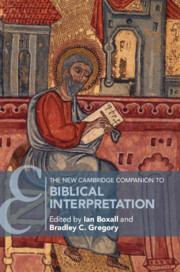Book contents
- The New Cambridge Companion to Biblical Interpretation
- Cambridge Companions to Religion
- The New Cambridge Companion to Biblical Interpretation
- Copyright page
- Contents
- Figures
- Contributors
- Acknowledgments
- Abbreviations
- Introduction
- Part I Methods
- Part II Frameworks/Stances
- Part III Reception
- 15 The Relevance of Textual Criticism for Biblical Interpretation
- 16 Premodern Interpretation and Contemporary Exegesis
- 17 The Bible and Literature
- 18 The Bible and Visual Exegesis
- 19 Uses of the Bible in Communities of Faith
- Scripture Index
- General Index
- Cambridge Companions to Religion
- References
15 - The Relevance of Textual Criticism for Biblical Interpretation
from Part III - Reception
Published online by Cambridge University Press: 15 October 2022
- The New Cambridge Companion to Biblical Interpretation
- Cambridge Companions to Religion
- The New Cambridge Companion to Biblical Interpretation
- Copyright page
- Contents
- Figures
- Contributors
- Acknowledgments
- Abbreviations
- Introduction
- Part I Methods
- Part II Frameworks/Stances
- Part III Reception
- 15 The Relevance of Textual Criticism for Biblical Interpretation
- 16 Premodern Interpretation and Contemporary Exegesis
- 17 The Bible and Literature
- 18 The Bible and Visual Exegesis
- 19 Uses of the Bible in Communities of Faith
- Scripture Index
- General Index
- Cambridge Companions to Religion
- References
Summary
This chapter discusses the different ways textual criticism and reception history are interrelated. Textual criticism is not simply the prerequisite to the task of interpretation but can help to illuminate the compositional growth, transmission, and early interpretation of biblical texts.
- Type
- Chapter
- Information
- The New Cambridge Companion to Biblical Interpretation , pp. 285 - 300Publisher: Cambridge University PressPrint publication year: 2022

